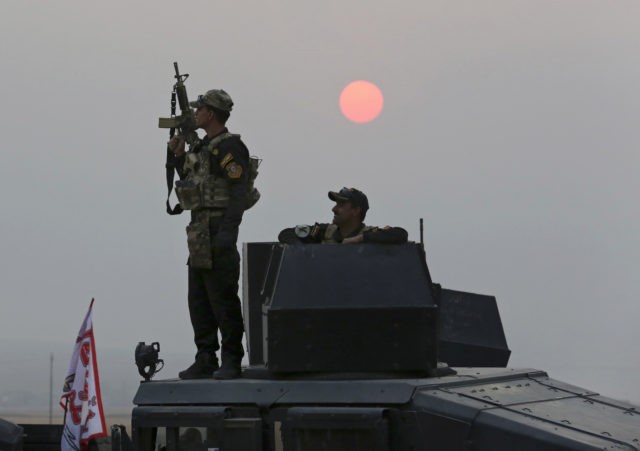Islamic State (ISIS/ISIL) terrorists executed nine fellow jihadis who fled battle by tossing them in burning oil trenches used to impede the vision of U.S.-backed Iraqi military troops fighting to push the militants out Iraq’s second-largest city Mosul, reports the Arabic-language Al Sumaria News, according to various translations.
The jihadis appeared to be burned alive.
“ISIS terrorist gangs executed nine of its members for fleeing the battle against the security forces in Mosul, by throwing them in trenches containing a burning oil, after tying their hands and legs,” reportedly notes Al Sumaria News.
“ISIS used the burning oil trenches to impede the vision of the Iraqi Army Aviation and international coalition air force,” it added.
Iraqi News noted that “ISIS is using the ugliest methods to murder its rebellious members, to prevent them from fleeing the battles against the security forces.”
A U.S.-backed force of up to 30,000 Iraqi Security Forces (ISF), Kurdish Peshmerga troops, Sunni tribesmen, and Shiite militiamen, many of them backed for Iran, are currently involved in the operation to recapture Mosul, home to more than a million people.
Up to 6,000 ISIS jihadists are fighting to defend the city, according to the Iraqi army.
An elite U.S.-trained unit of the Iraqi army known as the Counter Terrorism Service (CTS) is reportedly within about a mile from Mosul.
Reuters notes:
An elite unit of the Iraqi army paused its week-long advance on Mosul as it approached the city’s eastern edge on Tuesday, waiting for other U.S.-backed forces to close in on Islamic State’s last major urban stronghold in Iraq.
On the ninth day of the offensive on Mosul, government forces and allied Kurdish Peshmerga fighters are still fighting their way towards the outer limits of the northern city, in the early stages of an assault which could become the biggest military operation in Iraq in over a decade.
“Since the start of this operation, the noose has been tightening around Mosul from multiple axes of attack,” said U.S. Defense Secretary Ash Carter, speaking from the Hexagone-Balard in Paris, known as the “French Pentagon,” adding that the Mosul operation is “proceeding according to the plan we laid out.”
“The coalition is also eliminating ISIL’s leadership in Mosul—targeting more than 35 ISIL commanders there, including many of the highest, in the last 90 days. In fact, you might say the most dangerous job in Iraq right now is to be the military emir of Mosul,” he added.
American forces are embedded on the ground with the advancing Iraqi forces, serving as advisers and forward air controllers who call in U.S.-led coalition airstrikes. U.S. Navy Chief Petty Officer Jason Finan was killed while supporting the Mosul operation on October 20, three days after offensive began.
The U.S. military has said it is not backing the Shiite component of the Popular Mobilization Units (PMU), or Popular Mobilization Forces (PMF), a predominantly Shiite militia umbrella group that also includes Sunni tribesman. PMU fighters are participating in the ongoing battle for Mosul.
According to a top U.S. general, the Shiite militiamen are not under the control of the Shiite-led Iraqi government. Most members of the Iraqi military are Shiite.
The human rights group Amnesty International has warned that Shiite fighters will likely carry out atrocities against civilians in and around Sunni-majority Mosul, as they did earlier this year when participating in the U.S.-backed offensive to retake the Sunni-majority Iraqi city of Fallujah from ISIS.
More than 5,000 American troops have been deployed to Iraq. The vast majority of the U.S. troops in Iraq are supporting the Mosul offensive directly or indirectly, U.S. officials told Pentagon reporters on condition of anonymity.
“The Mosul campaign, which may become the biggest battle yet in the 13 years of turmoil unleashed by the U.S.-led invasion of Iraq in 2003, aims to crush the Iraqi half of Islamic State’s declared caliphate in Iraq and neighboring Syria,” explains Reuters.
“About 90 Islamic State-held villages and towns around Mosul have been retaken so far into the offensive, according to statements from the [Iraqi] army,” it adds. “The distance from the frontlines to the city ranges from just a couple of kilometers in the east, to 30 kilometers (nearly 20 miles) in the south.”
As of Sunday, the Iraqi forces had retaken nearly 310 square miles from ISIS, the U.S. officials told Pentagon reporters.

COMMENTS
Please let us know if you're having issues with commenting.